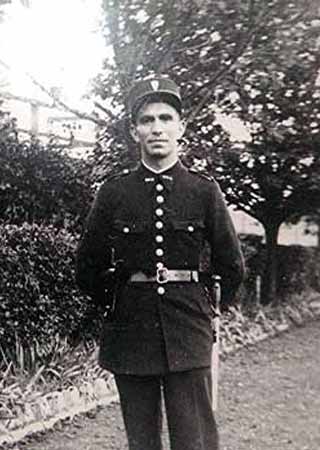 |
| Henri Mosmeau, Paris Police, and a member of the Resistance. He died in 1944, defending Paris against the occupiers. Source: France24 |
As I've studied WW2-era France, I've noticed a curious trend, a divergence of sorts between two classes of police officers:
- Group 1: Collaborators. Police officers tend to favor law-and-order, and are often comfortable enforcing tighter restrictions. They do their job, regardless of who they are working for. The French police forces were responsible for rounding up a LOT of undesirables so they could be sent to detention camps, and this group absolutely helped carry out the Holocaust.
- Group 2: Resistors. There were a few who did what they could to help the Resistance, including warning the different units of impending raids. As far as I can tell, this group was far smaller than the above, but they did exist.
Really, there was a third group, probably the single biggest: they did what they were told, but didn't like it. They knew it was wrong, but not knowing what else to do, they did their job anyway. I tend to include these men with the first group, because even unenthusiastic collaboration caused serious harm when the collaborator was in a position of power.
I wrote a scene that was intended to be a tribute to the second group, the police officers who did what they could to protect the people from Vichy or Nazis abuses, often at the risk of their own lives. I imagined this man later helping people join my grandfather's maquis unit, and sending them intelligence when he could. It's a good scene, one I intended to be funny, but it no longer fits in the book (they would have arrived in the afternoon, not in the wee hours as depicted below).
Anyway, here's the scene:
Arthur shook Roma awake, and they sleepily stumbled off the train in Valence.
Too tired and cash-strapped to look for an inn, they found an unoccupied bench at the train station and made themselves as comfortable as possible. Arthur removed his shoelaces and used one to tie his briefcase to his wrist. He shoved the suitcase under the bench and tied the handle to his ankle. Then they covered themselves with their coats, and he and Roma fell asleep cuddled together, Liliane on Arthur’s chest.
Something tapped Arthur’s shoe. Arthur ignored it. Then whatever-it-was smacked his shoe again, hard enough to hurt. Arthur woke up and found a police officer standing over him. Arthur jumped to his feet, nearly catapulting Liliane off his chest before Roma snatched the baby from him, which she did as neatly as if they had practiced the maneuver.
“Yes?” he said as politely as he could, trying to keep his balance with the suitcase tied to his ankle and briefcase dangling from his wrist. He felt both frightened and utterly foolish.
“You can’t sleep here. This isn’t a hotel.” The policeman was obviously trying not to laugh.
Arthur took advantage of the man’s mirth and gave him an embarrassed smile. “Yes, I am sorry. We got in at 1:30, and nothing was open. We will not be staying.”
“Best untie yourself before moving on,” he said, grinning slightly. “Clever idea. Ridiculous, but clever.”
“Uh, thank you. And yes, I will.”
“The markets are starting to open,” the officer added, “if you want something to eat, you should go early.”
Arthur glanced at his watch. It was now five-thirty, and there were a few early morning travelers milling around. “Oh, good.” He sat back down and untied his luggage, and re-laced his shoes. When they stood, the policeman wandered off, though he kept an eye on them as they left the train station.

